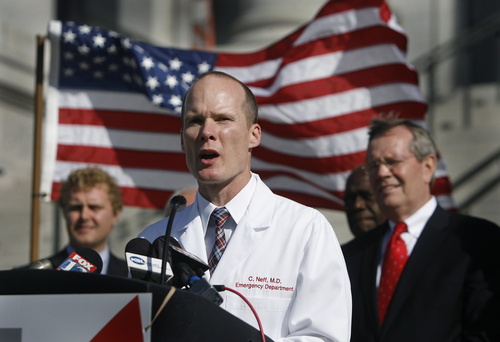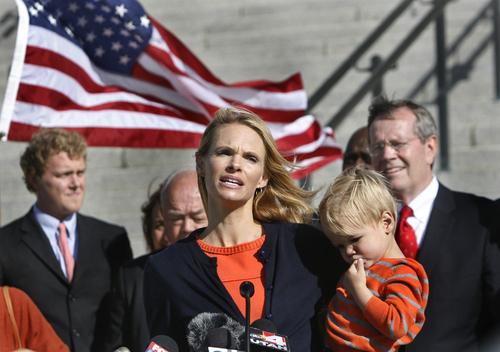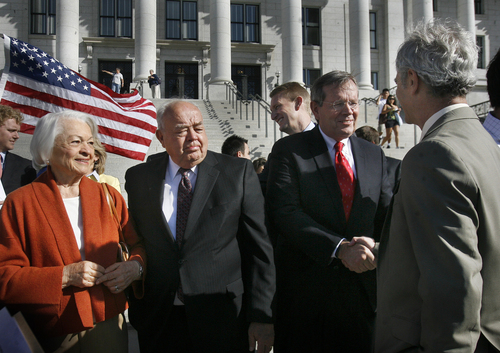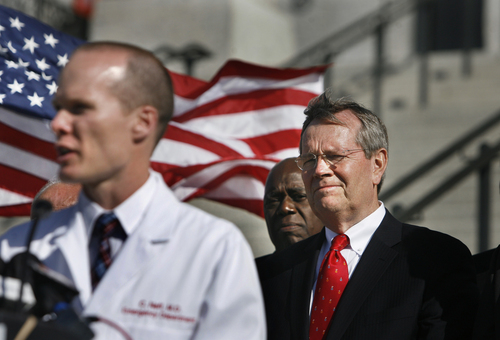This is an archived article that was published on sltrib.com in 2013, and information in the article may be outdated. It is provided only for personal research purposes and may not be reprinted.
Organizers of the Count My Vote movement filed paperwork with the lieutenant governor's office Wednesday, officially launching their bid to replace Utah's system of nominating candidates with a direct primary system.
Under the Count My Vote proposal, parties would hold direct primaries to choose their candidates to appear on the November general election ballot, abandoning the long-running system of caucuses and conventions.
"In the process, as it exists, every [election] year there are legislators who get elected by 30 or 40 people and there are literally thousands of people who don't get a chance to have their voice heard," said former Gov. Mike Leavitt, a co-chairman of the group.
The filing with the lieutenant governor starts a process public hearings and a drive to collect more than 102,000 petition signatures from across the state that would be needed before April 15, 2014, in order to put the measure on the ballot that November. If approved the change would be in effect for the 2016 election.
Organizers argue that the current system — where delegates chosen at neighborhood meetings pick most of the candidates for office at the party convention — is exclusionary, drives down engagement and voter turnout and yields candidates who are more politically extreme than the average Utahn.
—
Left out • They pointed to an LDS missionary, a mother, and an emergency room physician who said they were not able to attend their caucuses, which are held for several hours one night a year.
"I know I represent tens of thousands of Utah parents who share my frustration," said Amanda Allen, a mother who said she can't hire a baby sitter for several hours, or spend all day at the party convention. "The caucus system was not designed to facilitate the involvement of young families."
The kickoff press conference Wednesday at the Capitol was also attended by former Gov. Norm Bangerter, former first lady Norma Matheson, former House Speaker Dave Clark, and current Salt Lake County Mayor Ben McAdams and Salt Lake City Mayor Ralph Becker.
Opponents contend the Count My Vote effort is being led by deep-pocketed, old-guard politicians desperate to hang on to power and is derisively referred to as "Buy My Vote."
"I think going to a direct primary is a fundamental mistake for Utah," said James Evans, chairman of the Utah Republican Party, which has voiced its support for the current caucus system. "Frankly, with a direct primary, it would take so much more money for a candidate to win we would end up with a corporate- and special-interest-controlled Legislature compared to what we have now, which is a citizen-controlled Legislature."
—
Keeping the caucus • The GOP and the Democratic Party have both created task forces to recommend ways to make the caucuses more inclusive. Evans said his party's committee will present recommendations to address the exclusivity concerns Saturday at the GOP State Central Committee Meeting.
He said it remains possible that the state GOP will get behind a counter-initiative that would gather signatures to put a measure on the ballot to defend the caucus and convention system.
Fred Cox, a former Republican legislator who is working on the GOP recommendations, said he is concerned direct primaries would result in a system where only wealthy, well-funded candidates could get elected and there would be no incentive for candidates to visit rural areas, whereas now a candidate can't afford to neglect anywhere delegates live.
"I'm nervous that we're going back to a system Utah tried for 10 years and didn't like and we're going to create fly-over counties," he said. "[And] individuals who do not have the name-recognition or the money will have a much harder time getting involved to start with."
Some, like state Rep. Kraig Powell, R-Heber City, said the Republican Party could have changed the system and avoided the initiative effort, but refused to do so.
But he expressed frustration that the reform group took an all-or-nothing approach, pushing for direct primaries instead of a hybrid model floated previously that would have preserved the caucuses and conventions, but allowed other candidates to get on the primary ballot by gathering enough voter signatures.
"I do think the caucus-convention system has some unique advantages," Powell said. "To scrap it completely and go to primaries only ... has some disadvantages as well. It can lead to superficial campaigns, it can lead to large amounts of money being spent on campaigns."
The group has already raised more than $500,000 for its effort, most of it coming from just a few dozen large contributions.
Twitter: @RobertGehrke









